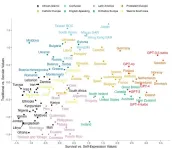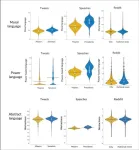(Press-News.org) Doctors and pharmacists treating people with blood thinners can reduce the rate of inappropriate dosing — as well as blood clots and strokes that can result from it — using an electronic patient management system, a study suggests.
The online dashboard, developed by the United States Veterans Health Administration in 2016, was designed to highlight and optimize the treatment of patients with direct oral anticoagulants, or DOACs, the most commonly prescribed blood thinners.
Researchers led by Michigan Medicine used the tool to assess over 120,000 cases in which patients with atrial fibrillation or venous thromboembolism, blood clots in the veins, were treated with DOACs at 123 VA hospitals from mid-2015 through 2019.
They found that between 6.9 and 8.6% of patients received incorrect prescriptions for blood thinners.
Adoption of the electronic DOAC patient management tool led to a decline in off-label dosing of around 8%.
The rate of blood clots and stroke also declined at every hospital that implemented the monitoring tool.
Results are published in the Journal of the American Heart Association.
“While DOACs are lifesaving medications for patients with common thrombotic conditions, they can also cause serious harm when prescribed inappropriately,” said Geoffrey Barnes, M.D., M.Sc., first author and associate professor of cardiology-internal medicine at U-M Medical School.
“Not only does our study show how commonly off-label dosing of DOACs occurs, but it highlights that utilizing this DOAC population health management tool can reduce that rate of inappropriate dosing as well as downstream complications, such as stroke and clotting.”
Direct oral anticoagulants can be incorrectly prescribed up to 20% of the time.
The two most prescribed DOACs are rivaroxaban (brand name Xarelto) and apixaban (brand name Eliquis.)
The sites that used the system the longest demonstrated a more significant decline in inappropriate prescribing.
In Michigan, the Michigan Anticoagulation Quality Improvement Initiative, a multi-center collaborative of statewide hospitals, built a similar dashboard using the Epic™ electronic health record.
Five hospitals across the state currently use that system, including University of Michigan Health.
“This study provides one of the largest and most impactful evaluations of an anticoagulation stewardship effort to show reduction in adverse clinical events,” Barnes said.
“Health systems and policymakers should consider investing in anticoagulation stewardship efforts that support pharmacists in reviewing and correcting off label direct oral anticoagulant dosing for the benefit of millions of patients who take these medications.”
Additional authors: Joshua Errickson, Ph.D., F. Jacob Seagull, Ph.D., Michael P. Dorsch, PharmD, M.S., Jeremy B. Sussman, M.D., M.S., all of University of Michigan, Charity Chen, M.S., and Rob Holleman, M.P.H., Sussman, all of the Ann Arbor VA Center for Clinical Management Research, Arthur L Allen, PharmD, CACP, of Veterans Affairs Salt Lake City Health Care System, and Patrick Spoutz, PharmD, BCPS, of Veterans Integrates Service Network 20.
Funding/disclosures: This project was funded by the Agency for Healthcare Research and Quality (AHRQ) through grant R18HS026874.
Support for MAQI2 is provided by Blue Cross Blue Shield of Michigan and Blue Care Network as part of the BCBSM Value Partnerships program.
Although Blue Cross Blue Shield of Michigan and MAQI2 work collaboratively, the opinions, beliefs and viewpoints expressed by the author do not necessarily reflect the opinions, beliefs and viewpoints of BCBSM or any of its employees.
Barnes consults for Pfizer, Bristol-Myers Squibb, Janssen, Bayer and AstraZeneca. He is on the Board of Directors for the Anticoagulation Forum.
Paper cited: “Pharmacist Use of a Population Management Dashboard for Safe Anticoagulant Prescribing: Evaluation of a Nation-wide Implementation Effort,” Journal of the American Heart Association. DOI: 0.1161/JAHA.124.035859
END
Risk of clots, stroke from incorrect blood thinner dosing reduced using online dashboard
Direct oral anticoagulants are the most popular blood thinners, yet doctors commonly prescribe the wrong dose
2024-09-17
ELSE PRESS RELEASES FROM THIS DATE:
Juan Jimenez named Blavatnik Regional Awards finalist
2024-09-17
UPTON, N.Y. — The Blavatnik Family Foundation and the New York Academy of Sciences have recognized chemical engineer Juan Jimenez as a Finalist in the 2024 Blavatnik Regional Awards for Young Scientists. Jimenez’s catalysis science research at the U.S. Department of Energy’s (DOE) Brookhaven National Laboratory opens doors for turning climate change-driving gases into industrially useful materials.
The yearly honor is awarded to distinguished early career researchers at institutions in ...
Nine outstanding postdoctoral scholars for the 2024 Blavatnik Regional Awards for Young Scientists announced
2024-09-17
NEW YORK – September 17, 2024 – The Blavatnik Family Foundation and The New York Academy of Sciences today announced the three Laureates and six Finalists of the 2024 Blavatnik Regional Awards for Young Scientists. The Awards honor outstanding postdoctoral scientists from academic research institutions across New York, New Jersey, and Connecticut.
The Blavatnik Regional Awards jury, consisting of distinguished scientists and engineers, selected one Laureate in each category who will receive a $30,000 unrestricted prize and two Finalists in each category who will be awarded $10,000 ...
People underestimate the income of the top 1%
2024-09-17
People selectively underestimate how rich the world’s richest people are, according to a study. Increasing income inequality in many countries is driven by steep gains among the top 1% of earners. In the United States, support for policies that would redistribute wealth has not increased since the 1970s, even as the share of incomes held by the top 1% of Americans jumped from 10% to 19%. Barnabas Szaszi and colleagues conducted four studies to explore how well people understand the wealth held by others. In one study, 990 US residents ...
ChatGPT and cultural bias
2024-09-17
A study finds that ChatGPT expresses cultural values resembling people in English-speaking and Protestant European countries. Large language models, including ChatGPT, are trained on data that overrepresent certain countries and cultures, raising the possibility that the output from these models may be culturally biased. René F Kizilcec and colleagues asked five different versions of OpenAI’s GPT to answer 10 questions drawn from the World Values Survey, an established measure of cultural values used for decades to collect data from countries around the world. The ten questions place respondents ...
National political dialogue focused on power and morals
2024-09-17
A study of political speeches, social media posts from politicians, and Reddit discussions among everyday users finds a higher prevalence of abstract, moralized, and power-centric language in national versus local politics. Political dialogue and debate in the United States has largely shifted from the local to the national in recent years, in part due to the decline of local news media. However, national discussions lack the concrete common ground that comes from shared place-based knowledge. Danica Dillion and colleagues studied how this shift is affecting ...
Police body-camera footage as data
2024-09-17
A study uses body-worn camera footage as a source of data on police-community interactions. Nicholas Camp and colleagues analyzed transcripts from 615 police stops made in California by Oakland Police Department police officers before and after a procedural justice training, which focused on officer communication in routine traffic stops. The training included findings by the authors in a previous study that showed officers used more respectful language with White drivers than with Black drivers during traffic stops. The training ...
Intimate partner violence: Preserving patient privacy saves lives
2024-09-17
Historically, South Carolina has had some of the highest rates of intimate partner violence, or IPV, in the U.S. IPV encompasses any physical or sexual violence, stalking and psychological aggression by a current or previous partner or spouse.
“There is an epidemic of intimate partner violence in South Carolina,” said Leslie A. Lenert, M.D., associate provost of Data Science and Informatics and director of the Biomedical Informatics Center at the Medical University of South Carolina.
To address that epidemic, Lenert partnered with clinical psychologist Alyssa A. Rheingold, Ph.D., family physician Vanessa Diaz, M.D., and health services ...
Moving particle simulation-aided soil plasticity analysis for earth pressure balance shield tunnelling
2024-09-17
Infrastructures often suffer severe damage due to geotechnical hazards of both natural kinds such as floods or earthquakes and man-made ones like underground construction work and excavations. The fields of civil engineering and disaster risk management have extensively studied methods to prevent these risks and are still looking for more effective ways of avoiding large-scale deformations associated with said hazards. The advent of computer-aided simulations has provided researchers with particle-based methods such as moving particle ...
Identifying body-scan postures suitable for people with hyperactivity tendency
2024-09-17
ADHD is a developmental condition of brain with symptoms such as inattention, hyperactivity or impulsivity. People with ADHD lack the ability of self-control and experience anxiety, depression, academic failure, and low self-confidence. These symptoms can be alleviated by a holistic approach such as mindfulness-based stress reduction and mindfulness-based cognitive therapy. These practices encourage patients to pay attention to the present moment with purpose and without judgment. However, these practices involving meditation require sitting in certain postures which can be challenging for patients with high ADHD tendency.
To address this, ...
Indiana University selects Symplectic Elements as faculty activity reporting system
2024-09-17
Digital Science, a technology company serving stakeholders across the research ecosystem, is pleased to announce that Indiana University has selected Symplectic Elements as its new faculty activity management and reporting system.
This strategic decision marks a significant advancement toward the university’s goals of streamlining the management and reporting of the work and accomplishments of its faculty.
Indiana University is internationally known for outstanding research and its world-class degree programs, from business and health to STEM and the arts at its flagship campus in Bloomington, the expanding ...
LAST 30 PRESS RELEASES:
A “smart fluid” you can reconfigure with temperature
New research suggests myopia is driven by how we use our eyes indoors
Scientists develop first-of-its-kind antibody to block Epstein Barr virus
With the right prompts, AI chatbots analyze big data accurately
Leisure-time physical activity and cancer mortality among cancer survivors
Chronic kidney disease severity and risk of cognitive impairment
Research highlights from the first Multidisciplinary Radiopharmaceutical Therapy Symposium
New guidelines from NCCN detail fundamental differences in cancer in children compared to adults
Four NYU faculty win Sloan Foundation research fellowships
Personal perception of body movement changes when using robotic prosthetics
Study shows brain responses to wildlife images can forecast online engagement — and could help conservation messaging
Extreme heat and drought at flowering could put future wheat harvests at risk
Harlequin ichthyosis: a comprehensive review of pathogenesis, diagnosis, and management
Smithsonian planetary scientists discover recent tectonic activity on the Moon
Government censorship of Chinese chatbots
Incorporating a robotic leg into one’s body image
Brain imaging reveals how wildlife photos open donor wallets
Wiley to expand Advanced Portfolio
Invisible battery parts finally seen with pioneering technique
Tropical forests generate rainfall worth billions, study finds
A yeast enzyme helps human cells overcome mitochondrial defects
Bacteria frozen in ancient underground ice cave found to be resistant against 10 modern antibiotics
Rhododendron-derived drugs now made by bacteria
Admissions for child maltreatment decreased during first phase of COVID-19 pandemic, but ICU admissions increased later
Power in motion: transforming energy harvesting with gyroscopes
Ketamine high NOT related to treatment success for people with alcohol problems, study finds
1 in 6 Medicare beneficiaries depend on telehealth for key medical care
Maps can encourage home radon testing in the right settings
Exploring the link between hearing loss and cognitive decline
Machine learning tool can predict serious transplant complications months earlier
[Press-News.org] Risk of clots, stroke from incorrect blood thinner dosing reduced using online dashboardDirect oral anticoagulants are the most popular blood thinners, yet doctors commonly prescribe the wrong dose







